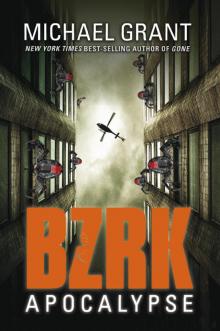- Home
- Michael Grant
Front Lines Page 15
Front Lines Read online
Page 15
“Well, since you are my prisoner, I guess the humane thing . . .” Frangie Marr digs a slightly mashed cigarette out of her pocket and hands it to Kerwin, who lights it up.
“The humane thing would be a cool shower followed by a soft cot with an electric fan blowing,” Kerwin says. “But thanks for the smoke.”
Rio notices Frangie looking at her and says, “What?”
“Nothing.” Frangie shrugs. “It doesn’t come off.”
“What doesn’t come off?”
“You looked at your hand after you shook mine. The black doesn’t come off on you.”
Rio feels a flush of embarrassment. “I wasn’t . . . I was just . . .” And concludes with, “Sorry.”
“I’m going to guess that you haven’t met many colored folks.”
“No,” Rio admits. “I mean, I’ve seen colored people in movies.”
“You like movies?”
“Sure I do. I go whenever I can afford it.”
A silence follows and stretches until Frangie says, “Have you seen Casablanca?”
“No, I missed it! Last movie I saw was called This Above All. I saw it right before I enlisted. I saw it with . . . a friend.”
“She means her boyfriend,” Kerwin offers. “Haven’t met him myself, but he’s a Handsome Fly-Boy.”
Rio rounds on Kerwin. “How do you know . . . Jenou. Of course.” She curses Jenou under her breath.
“Yep, Private Jenou Castain. She’s much more talkative than you, Richlin, plus I’ve seen you pull his photo out when you think no one’s looking.”
“He’s not exactly a boyfriend,” Rio grumbles. “He’s just a friend. Who’s a boy. A man.”
“You kiss him?” Frangie asks.
“That’s not exactly your business,” Rio huffs.
Kerwin says, “I swear I would sell my mother to pirates in exchange for a cool shower.”
Rio laughs, trying to lighten the mood after her sharp and defensive remark. “Pirates? A lot of pirates are there where you come from, Cassel?”
This leads into a general discussion of hometowns, home states, all the usual get-acquainted things. Cassel is from Teays, West Virginia, of course, coal country, as he has told Rio many times. That’s about six hundred miles from their current location, a bit closer than Frangie’s home. Rio has traveled the farthest to reach this miserable spot: twenty-five hundred miles.
“How you ever going to get home on leave?” Frangie asks.
“I’ll walk if I have to,” Rio says fervently.
“Maybe Handsome Fly-Boy will come fetch you in his airplane,” Kerwin teases. “You got a man . . . um, Private Marr?”
“Nope. I got me two brothers and parents. And sometimes some sick animals.”
Mention of sick animals intrigues Rio. “What kind of animals? You have livestock?”
“Naw, Tulsa is a city, no one’s got more than a chicken or two, but I tend to strays I find that are busted up.”
“Like a vet?”
“More like a bad vet,” Frangie says, and smiles at the memory. “But I do what I can with clean rags and iodine.”
“Maybe you could put in for cavalry. They still got horses and mules and such,” Kerwin says, and picks a praying mantis off his neck.
“There aren’t any black cavalry, not anymore.”
“Was there?”
“Back in olden times. Buffalo soldiers, that’s what the Indians called them on account of their nappy hair making Indians think of buffaloes.”
“Huh. My old granddad always says . . . ,” Kerwin begins. Then he stops. “Anyone else hear that?”
“Probably a proctor coming to get us,” Frangie says.
Kerwin sits up suddenly. “Uh-uh, city girl.”
And with that there’s a wild crashing sound of something bursting through vines and branches and—
“Run!”
The three of them launch from the log like someone’s set off a hand grenade, leaving their rifles behind.
“What is it?” Rio yells.
“It’s a tusker!” Kerwin yells back, leading the way toward a tree whose lower branches just might barely be within reach.
Rio shoots a look over her shoulder and sees something that looks like a small bear, but with a pig’s snout, a rat’s hair, and two curved tusks.
It’s not huge, but it sure is angry.
Cassel leaps, grabs a branch with the dexterity of a monkey, and swings himself up. Rio is right behind him, blessing her push-up-strengthened shoulders as she scrambles and hauls, gasping for breath. Lying flat on the branch, feet and hands dangling, she sees that there is no way short of sprouting wings for the diminutive Frangie to make it.
Rio yells, “Grab my hand!”
Frangie grabs Rio’s hand and Rio—with some help from Cassel—manages to pull Frangie up and out of range of the boar.
They are now six feet above the enraged pig. They gasp for breath, shaking, and then, suddenly, laughing.
Malevolent pig eyes stare up at them, and the pig circles, snorting and huffing, still furious at some imaginary insult. They edge closer to the trunk of the tree, finding more stable spots, not trusting the branch not to break.
“I shot one of his distant relations once,” Kerwin says. “I reckon that’s why he’s so worked up.”
“You’re a hunter?” Rio asks.
“Where I live you are either a hunter or you don’t see meat on your plate,” Kerwin admits. “We live way back up in the hills. I say Teays Valley ’cause that’s close as we get to a town, but I am pure hillbilly.”
“What do your folks do up in the hills?”
“Well, my pap works the coal mine. Cooks a bit of mash on the side for spending money, but he generally drinks half of what he makes, and then gambles the rest.” He softens his tone, fearing he’s been too harsh. “He’s a good man, my pap, never beats me more than a couple times a year, and he don’t lay hands on my mom. But he does like a drink and a card game, that he does.”
“I guess that’s a hard life, coal mining.” Frangie nods like she understands, though Rio is still digesting the fact that Kerwin finds it unusual that a man should not beat his wife.
“Yes, it is that,” Kerwin says. “It’ll be my life when this is all over.” His tone is resigned. “Come home after ten hours spent a mile down, probably blacker than your own pap, Private Marr. That coal dust gets into your skin so after a while you can’t wash it away, no matter how hard you scrub. By the time you’re forty it’s got you coughing up blood half the time. But it’s a living, and there’s plenty of folks ain’t got that.”
His tone of resignation irritates Rio, though she can’t think why. Is it because he sounds like she feels? Like life is planned out in advance in ways that don’t leave a lot of room for determining your own future?
“I’m going to try for college,” Frangie says.
“A little Nigra girl like you?” Kerwin laughs. It’s not a mean laugh, more the sort of sound you make when you hear a child talking nonsense.
“It could happen.” Frangie sounds defiant but not too sure of herself. “I have a cousin up in Chicago went to college. He’s got a good job now.”
“Well, that may be,” Kerwin allows. “But most likely I end up in the mine and you end up taking in laundry and having a whole passel of little pickaninnies, and that’s a fact. And Private Richlin, here, she’s probably going to be an old-maid schoolteacher.”
“Old maid, huh?” Rio recognizes his teasing tone for what it is, but she still doesn’t like the image he’s called to mind. “What makes you think I’ll be an old maid?”
“Hell, Richlin, you’re too ornery for any man to stay married to you.”
It’s the first time anyone has referred to Rio as ornery. Or any other synonym for ornery. It brings a reluctant smile to her lips.
Ornery.
“You want to hear a story, Private Marr?” Kerwin asks.
“I got time on my hands,” Frangie says ruefully.
> “See, there’s this old boy doesn’t like the ladies taking part in this here war, and he makes some rude suggestions to Private Richlin. Well—”
“Oh come on, Cassel, don’t tell that story. I sound like some kind of crazy person.”
“Well, now I have got to hear it,” Frangie says.
For the next hour they swap stories, some funny, some not, and Rio’s still grinning when the proctor finds them. He’s a senior NCO armed with a clipboard and a pistol. He fires a round in the air, and the pig just stares at him. The NCO levels the pistol at the pig, which snorts derisively and finally trots off into the woods.
“What’s going on here?” the proctor asks, drawling the words.
“These are my prisoners, Sergeant,” Frangie answers.
Kerwin says, “Uh, Sergeant? I don’t suppose you need to mention any details of this to anyone else, do you?”
“You mean you being caught by a tiny little Nigra girl and getting chased up a tree by a pig? My lips are sealed, Private.”
Rio is prepared to believe this until later, when the badly beaten Blue Team is at chow and Jack slices into his ham steak, holds up a piece on the end of his fork, and says, “Richlin, I do hope this isn’t a friend of yours.”
Rio accepts the ribbing with good nature, just as the entire platoon has had to endure ridicule for losing the day’s exercise to a colored platoon. She’s still digesting the fact that she, little Rio Richlin from Gedwell Falls nowhere, is seen as ornery.
Well. Maybe I am.
15
FRANGIE MARR—CAMP SZEKELY, SMIDVILLE, GEORGIA, USA
“I got those Szekely blues, just as blue as I can be,” Frangie sings to herself, freely adapting the W. C. Handy song “St. Louis Blues.” “Oh, my sergeant’s got a heart like a rock cast in the sea. Or else he wouldn’t have been so mean to me.”
She has not felt much like singing lately, but tomorrow is to be her first time off-post since coming to this steamy backwater, and she’s walking toward the barracks, coming from the laundry with fresh uniforms and a spring in her step. Frangie’s lucky that for her home is just a sixteen-hour bus and train ride away. For most of the soldiers at Camp Szekely, a three-day pass means staying with one of the black families in Smidville that will host lonesome soldiers for fifty cents a night.
Smidville isn’t much of a town, and what there is of it is whites only. For black soldiers there’s a juke joint out on the highway where for two dollars you can get pretty drunk and listen to some amateur musicians playing jazz or blues. But that’s one thing for the men, a whole different matter for females: an unaccompanied woman at a juke joint is looking for trouble. Even an accompanied woman might not be so safe.
Most of the few women soldiers on the post live too far off to get home and back, so they stay in the barracks, even when they have a chance to get away, but Frangie has done her research and timed it all out, and there’s a bus that will carry colored passengers in the last three rows to Atlanta, where she can catch a train to Tulsa. She’s got leave coming; leave that, if everything works just right, will let her spend almost a day and a half with her family.
“If I feel tomorrow like I feel today, I’m gonna pack my trunk and make my getaway.” Normally she sings in the church choir, the old standards like “Onward Christian Soldiers” and “Hard Trials” and “Go Down, Moses.” Fond memories of warm nights practicing with the choir prompt her to begin a spontaneous rewrite of “My Way’s Cloudy.”
“Old Captain’s mad, and I am glad, send them angels down! We’re comin’ on to ’43, send them angels down. We’re marchin’ on to gay Paree, oh send them angels down!”
A day and a half without marching or KP or any of the other strains and indignities of military life sounds pretty good.
“Hey there, Private, that’s a pretty voice you have. You want a ride back to barracks? Sweet thing like you shouldn’t have to walk all that way carrying a box.”
He’s a white sergeant, driving an open jeep at walking speed, now keeping pace with her. A tingle of fear goes up her spine. His voice slurs from drink.
“No thanks, Sergeant. I don’t mind the walk.”
“Well, isn’t that a hell of a thing. A white man offers you a ride and you turn him down?”
She glances at him. He’s a tall man with a thin face and blue eyes that don’t quite want to focus on a single point. “I don’t want any trouble, Sergeant. I like to walk.”
“Trouble? Who said anything about trouble?”
“It’s not far.” Maybe it wasn’t far to walk, but now she is measuring the length of this dusty, deserted, hard-pack street with a whole different appreciation for distance. How far can she run before dropping her bundle? Can the jeep follow her across the parade ground if she gets off the road?
She accelerates her walking pace. He notices.
“You’re not trying to get away from me now, are you?”
Fear is a hard knot in her stomach. The tension in her muscles crushes the cardboard box under her arm. There is no point in answering him; she’s encountered his kind before, and he will not listen to reason.
“I’m thinking when a white sergeant offers a ride to a Nigra private, she better just get her little black ass on board with the program.”
“No, Sergeant,” she says. Her teeth are chattering, and the distance to safety shrinks too slowly. If she runs what will he do? He might just laugh and call out names at her. Or he might race and catch up to her. He might even “accidentally” turn the car into her.
Best not to run until she has to. Best to just keep walking and pray God sends some help. She sees two black soldiers crossing the road, but they are three hundred yards off; anyway, what are they going to do?
Just keep walking.
The sergeant guns the car and yanks it right into her path. No question now that he’s drunk; she can smell it wafting from him.
“You get your ass up here right now, Nigra, you and me are going for a little ride to somewhere private. Private, Private.” He laughs. Then he switches to a friendlier tone. “Come on, honey, it won’t be anything you haven’t done before, it’ll just be vanilla instead of chocolate.”
She tries to pass behind the jeep. He grinds the gear into reverse and cuts her off. The fender strikes her thigh, a painful glancing blow, but she barely notices the pain.
“Sergeant, if you keep bothering me I’ll take it to my captain.”
He grins. “The word of a Nigra private against a white noncom? How do you reckon that works out? Come on, little brown sugar, I’ll make it quick, might be you’ll even like it.”
Two big deuce-and-a-half trucks come rolling by, and to Frangie’s infinite relief, the soldiers in the back are black. They are not from her unit, but one of the NCOs sees what’s what and raps on the hood of the trailing truck, bringing it to a shuddering, bouncing halt.
Ten black faces turn to watch, and none of those faces are amused.
“What’s your name, Private?” the black sergeant calls down to her.
“Private Frangie Marr, Sergeant,” she calls out in a trembling voice.
“Are you done giving directions to Sergeant Embleton?”
It takes her a few beats to realize what he’s doing. She breathes a sigh of relief. “I believe so, Sergeant.”
“Well then, you best climb up here and ride along with us.”
Strong hands haul Frangie up over the tailgate, and she wedges in on the hard plank seat between a male and female GI. Her rescuer is only a few inches taller than she, but quite a bit wider, with bunched muscles straining his uniform. He has the stripes of a technical sergeant, three up-pointed chevrons, two arced ones beneath, which gives him rank over Embleton.
“Hey now, boy,” Embleton yells, “that’s my piece of tail there. You hand her right the hell back down.”
Somewhat at odds with his hard face and body, Frangie’s savior wears wire-rimmed glasses, and she watches, fascinated, as the eyes behind those spectacles shift from w
orried to angry.
“Goddammit, boy, you best hand her back down if you know what’s good for you!”
The black sergeant is doing a slow boil, and she almost wants to tell him no, don’t make trouble.
Almost.
What she says is, “Thanks, Sarge.”
He ignores her and hops down from the truck, combat boots hard on the packed clay. He snaps fingers over his shoulder and is handed a rifle by one of his men.
“Sergeant Embleton, I believe you may be under the weather,” he says. Embleton looks wary, glancing from the advancing man with a rifle to the truckload of black faces behind him.
“No harm meant, Green,” Embleton says.
Green says, “Yes, I do believe you are drunk and driving a jeep, which could mean loss of rank, Embleton. Especially since you managed to bust out your headlight.”
“I didn’t bust out no—”
Crumpf!
Sergeant Green smashes the butt of the rifle into the left headlight of the jeep.
Embleton watches, groans, and Frangie sees real fear on the white man’s face. That simple reality amazes her. White men do not fear black men, not in her world.
“Now, I don’t know what one-horse cracker town you come from, Embleton, but we aren’t there. We’re on an American army post. And I believe you have been warned about messing with female soldiers before.”
“You don’t talk to me like that, boy.” Despite the drink, there is authority in that voice, a sense of right, a tone full of brutal history.
Sergeant Green stiff-arms the rifle back up to his corporal. He places his hands deliberately on the frame of the windshield and door of the jeep, looming over Embleton despite being the shorter man. “I find out you pulled anything like this again, and it won’t be the headlight that gets a rifle butt. Do you understand me clearly? Now, you get this jeep back to the motor pool and hope they believe whatever bullshit story you come up with to explain the damage.”
Hate, pure and undisguised, radiates from Embleton’s face. But in the end, he drives away, wheels churning red dust.
Frangie closes her eyes and drinks in relief. She thanks Sergeant Green again.

 Fear
Fear Plague
Plague BZRK: Apocalypse
BZRK: Apocalypse Bzrk
Bzrk Love Sucks and Then You Die
Love Sucks and Then You Die Silver Stars
Silver Stars The Key
The Key Front Lines
Front Lines BZRK Origins
BZRK Origins Monster
Monster Gone
Gone The Snake
The Snake The Power
The Power Hunger
Hunger Lies
Lies A Sudden Death in Cyprus
A Sudden Death in Cyprus Messenger of Fear
Messenger of Fear Eve & Adam
Eve & Adam The Trap
The Trap Light
Light An Artful Assassin in Amsterdam
An Artful Assassin in Amsterdam The Call
The Call Hero
Hero Soldier Girls in Action
Soldier Girls in Action Purple Hearts
Purple Hearts The Tattooed Heart
The Tattooed Heart The Fall of the Roman Empire
The Fall of the Roman Empire BZRK Reloaded
BZRK Reloaded Messenger of Fear Novella #1
Messenger of Fear Novella #1 The Magnificent 12
The Magnificent 12 Fear: A Gone Novel
Fear: A Gone Novel Villain
Villain Manhattan
Manhattan Eve and Adam
Eve and Adam Plague: A Gone Novel
Plague: A Gone Novel Fergie Rises
Fergie Rises In the Time of Famine
In the Time of Famine Hunger_A Gone Novel
Hunger_A Gone Novel Lies g-3
Lies g-3